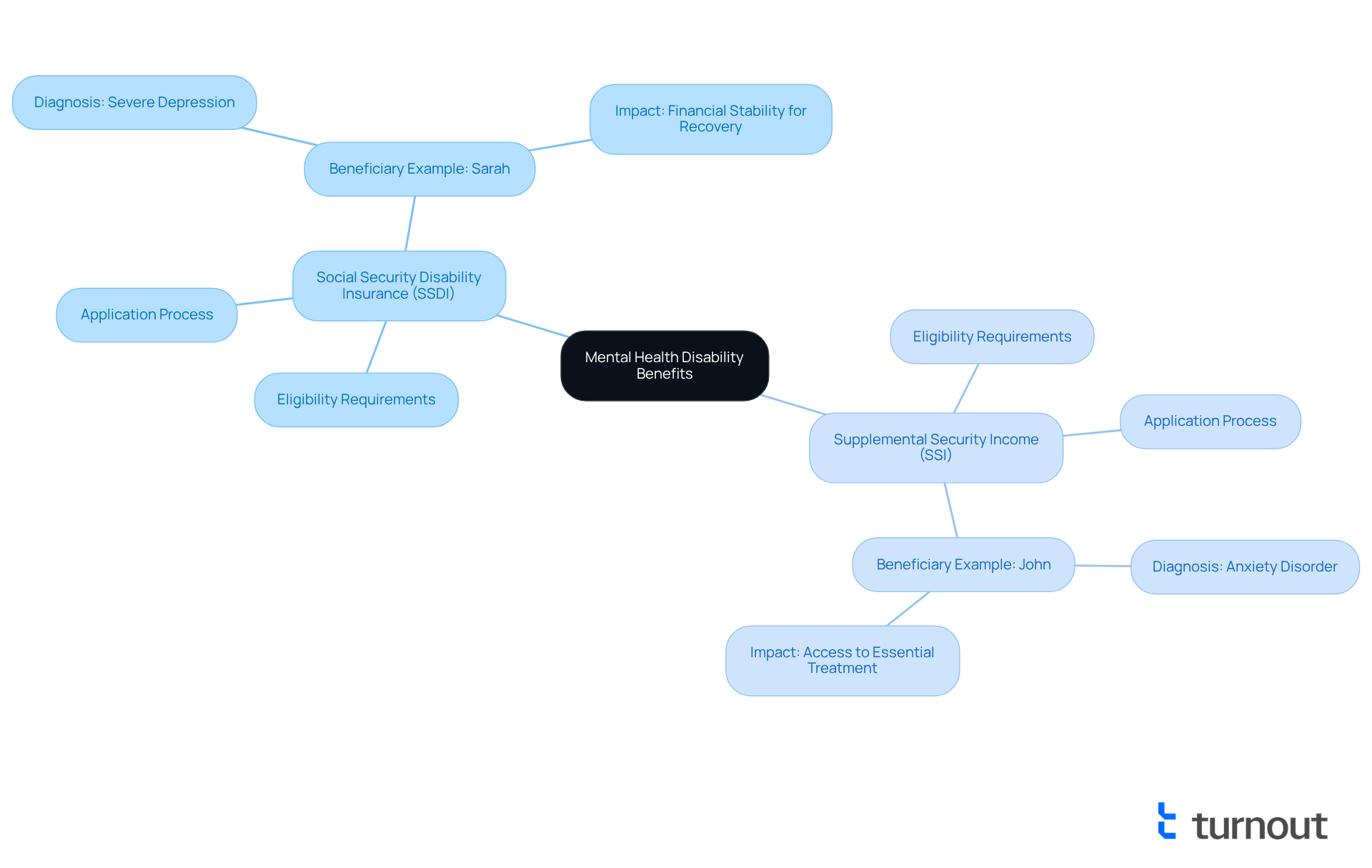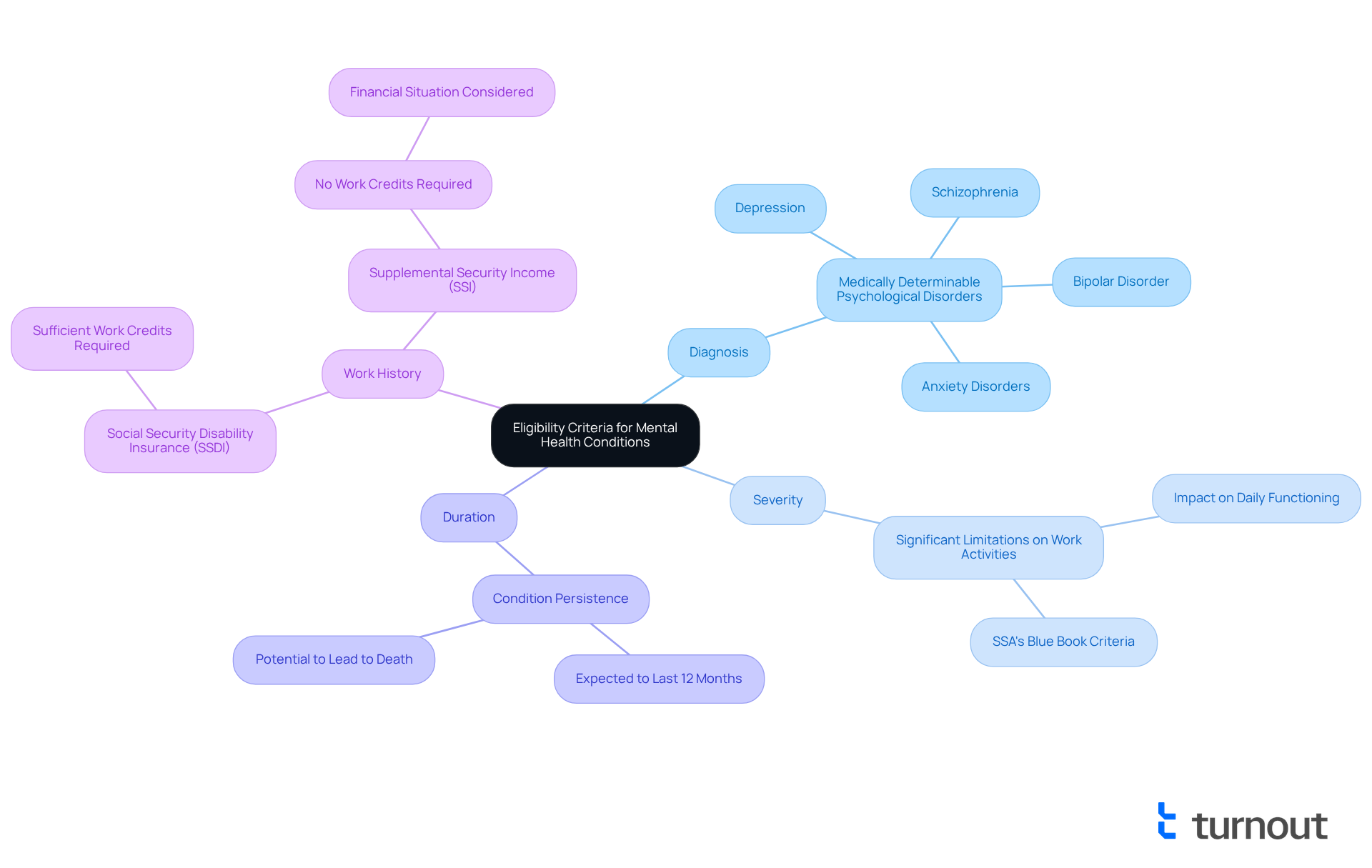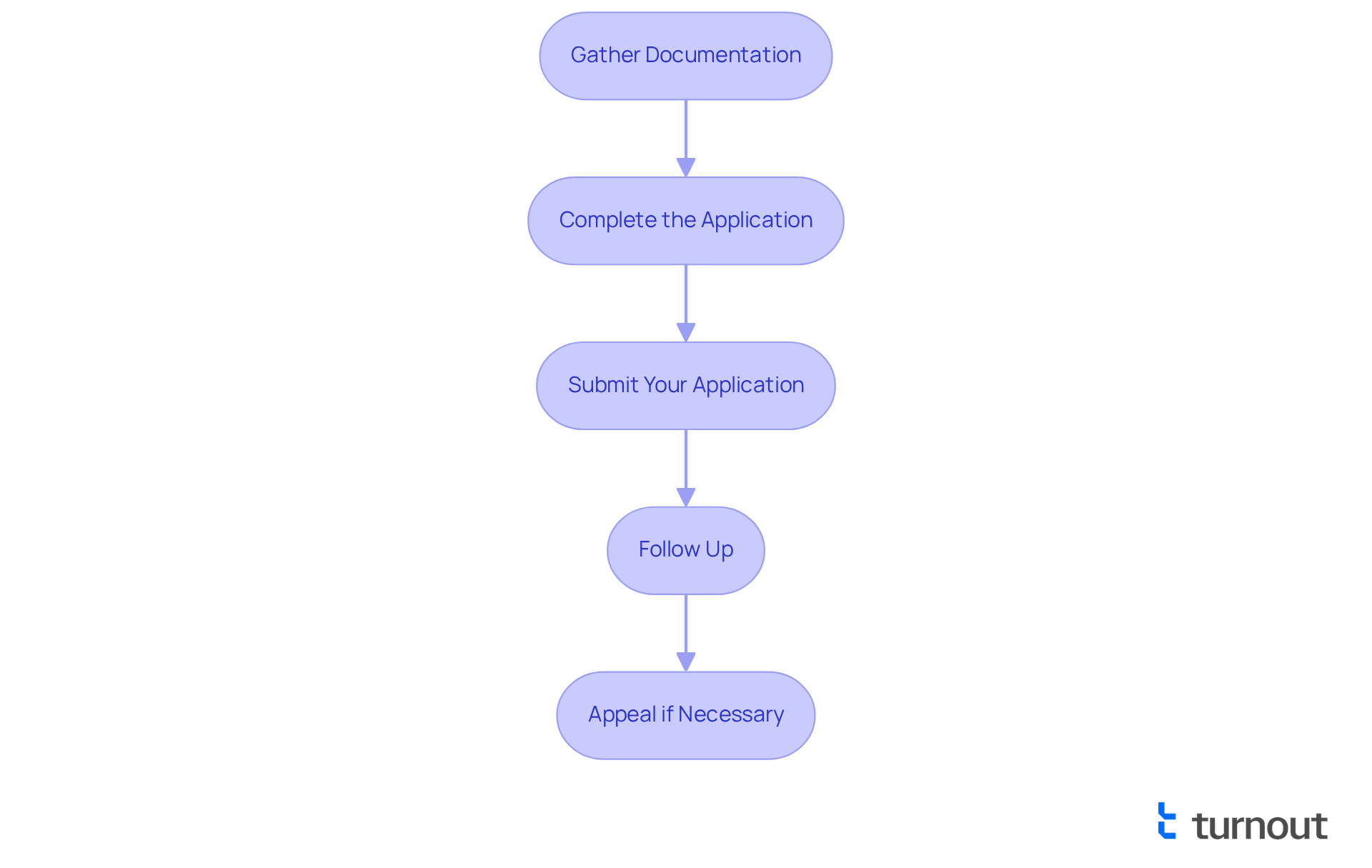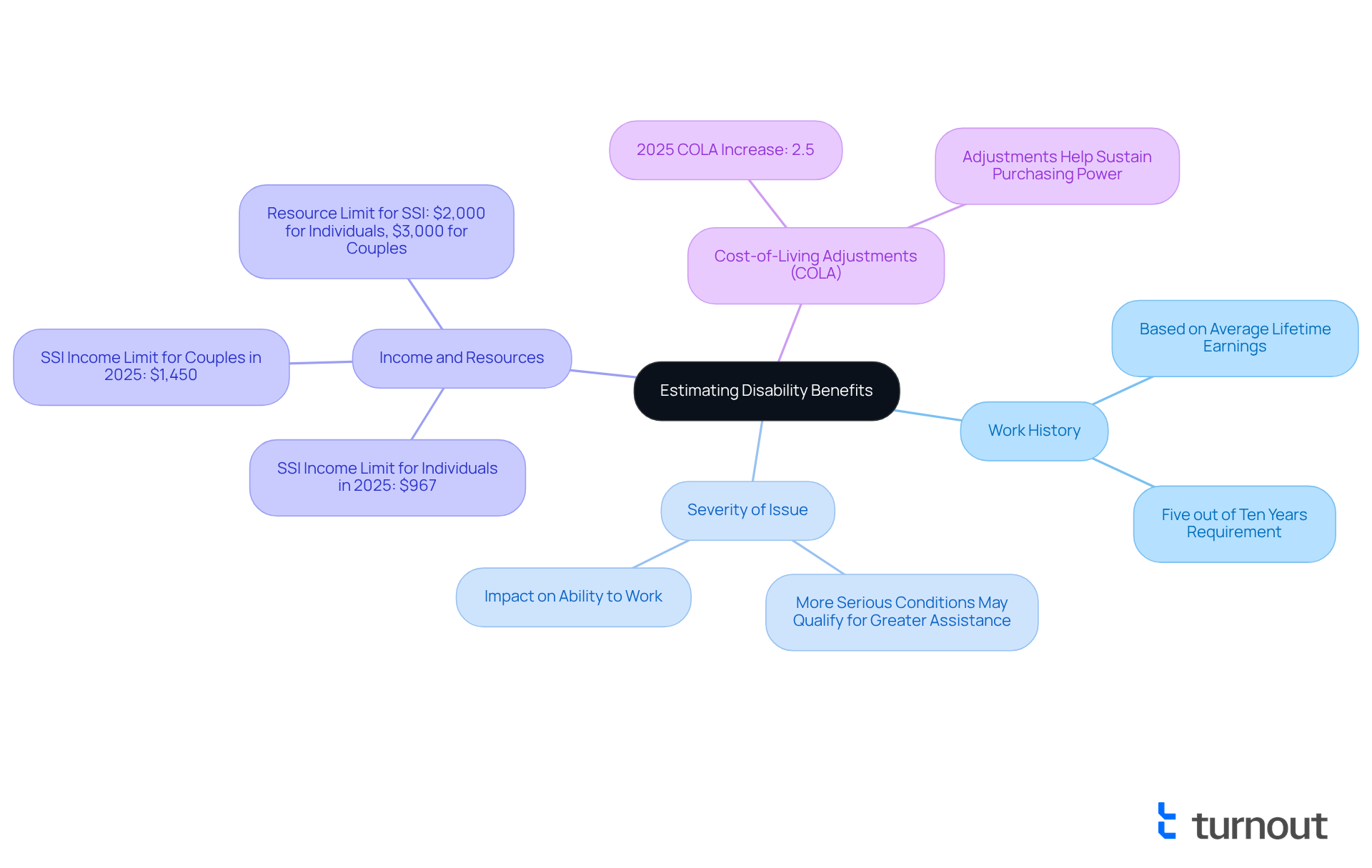Overview
Navigating mental health disability benefits can be challenging, and it's important to understand the options available to you. Programs like Social Security Disability Insurance (SSDI) and Supplemental Security Income (SSI) offer different payment structures designed to support individuals in need.
We recognize that SSDI payments are influenced by your work history, which can feel overwhelming. On the other hand, SSI payments depend on your income and resources, with maximum monthly amounts expected to reach $967 for individuals in 2025. This reflects a growing acknowledgment of mental health issues in the disability landscape.
You're not alone in this journey, and we're here to help you find the support you need.
Introduction
Understanding the intricacies of mental health disability benefits is crucial for those grappling with psychological challenges that hinder their ability to work. We recognize that navigating this system can feel overwhelming. Millions rely on programs like Social Security Disability Insurance (SSDI) and Supplemental Security Income (SSI), and the financial support available can significantly impact recovery and daily life.
However, the process of determining eligibility and estimating potential benefits can seem daunting. It's common to feel lost in the details.
How can individuals effectively navigate this system to secure the assistance they need? You are not alone in this journey, and we’re here to help you find the support that can make a difference.
Understand Mental Health Disability Benefits
Support for individuals with psychological disorders provides vital financial assistance, prompting the question of how much does mental health disability pay for those whose emotional challenges significantly hinder their ability to work. We understand that navigating these challenges can be overwhelming, and knowing about available resources can make a difference. Two primary programs provide these essential benefits:
-
Social Security Disability Insurance (SSDI): Designed for individuals who have contributed to Social Security through their work history, SSDI requires applicants to demonstrate a psychological issue that prevents them from engaging in substantial gainful activity (SGA).
-
Supplemental Security Income (SSI): This program supports individuals with limited income and resources, irrespective of their employment background. Eligibility hinges on financial necessity and the severity of the psychological issue.
As of 2025, approximately 1.5 million individuals are receiving SSDI support specifically for mental health conditions. This reflects a growing recognition of mental health issues within the disability landscape. Recent updates to the SSDI program have aimed to simplify the application process, making it more accessible for those in need.
Understanding how much mental health disability pays is crucial for assessing eligibility and the potential benefits available. Consider the stories of individuals like Sarah, who, after being diagnosed with severe depression, often asks how much does mental health disability pay through SSDI. Her financial stability allows her to focus on recovery. Similarly, John, a beneficiary of SSI, has accessed essential treatment for his anxiety disorder, which makes one wonder how much does mental health disability pay in supporting recovery from psychological issues.
Mental wellness experts emphasize the significance of these benefits in fostering recovery. They remind us that a psychological support system should nurture strengths and resilience, enabling individuals to manage their challenges effectively. By familiarizing yourself with SSDI and SSI, you can take the first step toward securing the support you need. Remember, you are not alone in this journey. While Turnout is not a law firm and does not provide legal advice, it offers assistance through trained nonlawyer advocates to help clients navigate these complex systems. We're here to help you every step of the way.

Identify Eligibility Criteria for Mental Health Conditions
If you're considering applying for mental health disability benefits, it's important to understand how much does mental health disability pay and the specific criteria established by the SSA. These requirements can feel overwhelming, but we're here to help guide you through the process.
-
Diagnosis: You will need a medically determinable psychological disorder, such as depression, anxiety disorders, bipolar disorder, or schizophrenia. We understand that recognizing these conditions can be challenging, but acknowledging them is the first step toward getting the support you need.
-
Severity: Your condition must significantly limit your ability to perform basic work activities. The SSA's Blue Book outlines the criteria for various psychological disorders, serving as a valuable resource in your journey.
-
Duration: It's essential that your psychological disorder is expected to persist for at least 12 months or lead to death. This requirement underscores the seriousness of your situation, and we recognize how difficult this can be to confront.
-
Work History: For Social Security Disability Insurance (SSDI), you will need sufficient work credits based on your employment history. Conversely, Supplemental Security Income (SSI) does not require work credits but does take your financial situation into account.
Recent updates show that the SSA is increasingly recognizing the prevalence of psychological disorders among SSDI applicants. This shift has sparked discussions about refining the qualification criteria, which may lead to more support for those in need.
Successful claims often hinge on providing thorough medical evidence that illustrates the seriousness and impact of your illness on daily functioning. Understanding how much does mental health disability pay is crucial for determining your eligibility and effectively preparing your application. Remember, you are not alone in this journey, and we are here to support you every step of the way.

Navigate the Application Process for Benefits
Navigating the application process for mental health disability benefits can feel overwhelming, but you are not alone in this journey. Here are some key steps to guide you through:
-
Gather Documentation: Start by collecting all necessary medical records, including diagnoses, treatment history, and any relevant psychological evaluations. This documentation is crucial for substantiating your claim and can provide the support you need.
-
Complete the Application: You can apply online through the SSA website, by phone, or in person at your local SSA office. Ensure that you fill out all sections accurately and provide detailed information about your condition. Remember, clarity can make a big difference.
-
Submit Your Application: After completing the application, submit it along with your supporting documents. Keeping copies of everything for your records is essential, as it helps you stay organized and informed.
-
Follow Up: Once you’ve submitted your application, monitor its status. It’s common to feel anxious during this time, but staying proactive can ease your worries. You may need to provide additional information or attend a consultative examination if requested by the SSA.
-
Appeal if Necessary: If your application is denied, don’t be discouraged. You have the right to appeal the decision. This process involves submitting a request for reconsideration and may require additional documentation or support. Remember, many successful applicants faced similar challenges.
By following these steps, you can navigate the application process with greater confidence. Successful applicants often emphasize the importance of thorough documentation and staying proactive throughout the process. You deserve the support you seek, and we’re here to help you every step of the way.

Estimate Your Potential Disability Benefit Amount
Estimating how much does mental health disability pay can feel overwhelming, but understanding a few key factors can help you navigate this process with confidence.
-
Work History: If you're considering Social Security Disability Insurance (SSDI), it's important to know that your payment amount is based on your average lifetime earnings covered by Social Security. You might find it helpful to use the SSA's online payment calculators, which can assist you in estimating your monthly amount based on your work history.
-
Severity of Issue: We understand that the seriousness of your mental health issue is a crucial factor in determining how much does mental health disability pay. Generally, more serious conditions may qualify for greater assistance, reflecting the impact on your ability to work.
-
Income and Resources: For those looking into Supplemental Security Income (SSI), your payment amount will be influenced by your income and resources. In 2025, the highest federal assistance rate is expected to be $967 monthly for individuals, with potential adjustments based on state supplements. Couples may receive up to $1,450 monthly.
-
Cost-of-Living Adjustments (COLA): It's common to feel concerned about rising living expenses, and benefits are adjusted annually to help with inflation. For 2025, the SSA has announced a 2.5% increase in assistance, which will directly affect the total sum you receive, helping to sustain your purchasing power.
By considering these factors, you can better estimate how much does mental health disability pay in terms of your potential benefit amount. Remember, you are not alone in this journey, and we're here to help you plan your financial future with greater clarity and peace of mind.

Conclusion
Understanding mental health disability benefits is essential for individuals facing emotional challenges that significantly impact their ability to work. Programs like Social Security Disability Insurance (SSDI) and Supplemental Security Income (SSI) provide crucial financial support. This support allows beneficiaries to focus on their recovery rather than financial instability. By familiarizing yourself with these benefits, you can take proactive steps toward securing the assistance you need.
The article outlines the eligibility criteria for mental health disability benefits. It emphasizes the importance of:
- Having a medically determinable psychological disorder
- Demonstrating the severity of the condition
- Understanding the application process
Additionally, it highlights how factors such as work history, the severity of the mental health issue, and income levels can influence the potential benefit amounts. These insights are vital for anyone considering applying for benefits, as they can significantly impact the outcome of your application.
Navigating the complexities of mental health disability benefits can feel overwhelming, but you're not alone in this journey. By understanding the available programs, eligibility criteria, and application processes, you can empower yourself to seek the assistance you deserve. Remember, help is available, and taking the first step toward securing these benefits can lead to a more stable and hopeful future.
Frequently Asked Questions
What types of mental health disability benefits are available?
The two primary programs providing mental health disability benefits are Social Security Disability Insurance (SSDI) and Supplemental Security Income (SSI).
Who is eligible for Social Security Disability Insurance (SSDI)?
SSDI is designed for individuals who have contributed to Social Security through their work history and must demonstrate a psychological issue that prevents them from engaging in substantial gainful activity (SGA).
What is Supplemental Security Income (SSI) and who qualifies for it?
SSI supports individuals with limited income and resources, regardless of their employment background. Eligibility is based on financial necessity and the severity of the psychological issue.
How many individuals receive SSDI support for mental health conditions?
As of 2025, approximately 1.5 million individuals are receiving SSDI support specifically for mental health conditions.
What recent updates have been made to the SSDI program?
Recent updates to the SSDI program have aimed to simplify the application process, making it more accessible for those in need.
How do mental health disability benefits support recovery?
Mental health disability benefits, such as those from SSDI and SSI, provide financial stability that allows individuals to focus on their recovery and access essential treatments.
Can I receive assistance in navigating the SSDI and SSI application process?
Yes, while Turnout is not a law firm and does not provide legal advice, it offers assistance through trained nonlawyer advocates to help clients navigate these complex systems.

